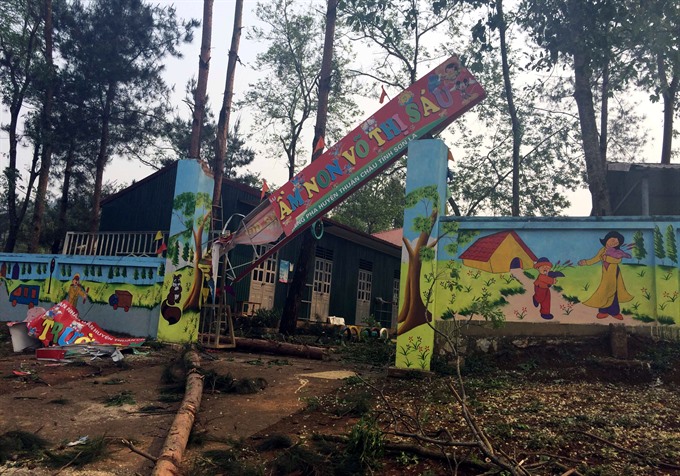 Society
Society

Meteorology and agriculture experts have urged localities to take initiative in responding to natural disasters as the disasters are forecast to be more severe this year but the preparation of Việt Nam is still weak.
 |
| The front gate of a kindergarten in Chiềng Pha Commune, Thuận Châu District, Sơn La Province was destroyed by thunderstorm and hail last year. — VNA/VNS Photo Công Luật |
HÀ NỘI — Meteorology and agriculture experts have urged localities to take the initiative in responding to natural disasters, with Việt Nam’s weak preparations set to be tested by severe weather this year.
“It is predicted that there will be many more floods, flashfloods and landslides this year than last year, especially in the western-northern area,” said Hoàng Đức Cường, director of the National Centre for Hydro-Meteorology Forecasting (NCHMF) at a conference in Hà Nội on Thursday.
Cường said that the mountainous area in the north had complex terrain with high hills, divided into different climates so it suffered natural disasters frequently, causing great damage.
“Natural disasters such as storms, tropical depressions, heavy rain, landslides, thunderstorms, whirlwinds, severe cold spells and heat are common,” he said.
Flash floods often occur during the flood season in the region from May to October, affecting the upper Đà River in Lai Châu, Điện Biên and Sơn La provinces, upper Chảy River in Lào Cai and Yên Bái provinces, upper Lô River in Hà Giang Province, and upper Cầu River in Bắc Kạn Province.
Cường pointed out that one limitation of forecasting was that at present, it was impossible to forecast natural disasters such as thunderstorms, floods, flashfloods and landslides.
“Việt Nam has just gained the ability to warn of potential flashfloods in an area,” he said, adding that the warning technology for mountainous areas was mainly based on statistics and maps of risk.
He stressed that the flashflood and landslide warning technology was not completely built or fully researched while investment for flashflood and landslide warning was not synchronised with automatic measurement and remote sensing equipments.
"Therefore, northern mountainous provinces should focus on prevention," Cường said.
According to the NCHMF’s forecast, there will be about 13-15 storms and tropical depressions in the East Sea during the storm season this year, above the average of 12 disasters in recent years. Three to four storms and tropical depressions are forecast to effect Việt Nam’s shores.
Deputy Minister of Agriculture and Rural Development Hoàng Văn Thắng said at the conference that high risk areas should relocate locals and improve forecasting capacity.
He also urged improving people’s skills in responding to natural disasters alongside protecting natural resources such as forests and ecosystems in disaster-prone areas.
"Disaster response in mountainous areas must identify the patterns of natural disasters, with the motto of proactively responding to disasters before they occur,” Thắng said.
“It is necessary to step up the integration of natural disaster prevention and control into local socio-economic development planning and plans, develop criteria for safety works against natural disasters, especially housing, on the basis of reviewing, evaluating, relocating and prohibiting the construction of works and houses in places with a high risk of floods."
A report by the Ministry of Agriculture and Rural Development showed that in 2016, the northern mountainous region was affected by 24 severe cold spells, four storms and torrential rain, thunderstorms and hail. Natural disasters in 18 provinces in the region caused 109 people to die or go missing. Total material damage was estimated at more than VNĐ5.8 trillion (US$257.8 million).
Regarding relocating people from high risk areas, the Central Steering Committee for Disaster Prevention and Control said that so far, 18 northern mountainous provinces have relocated about 9,700 households, with nearly 5,000 households in the disaster areas, about 46 per cent of the plan. Fourteen of the 18 provinces have finished reviewing and zoning the high risk areas of landslides. — VNS




